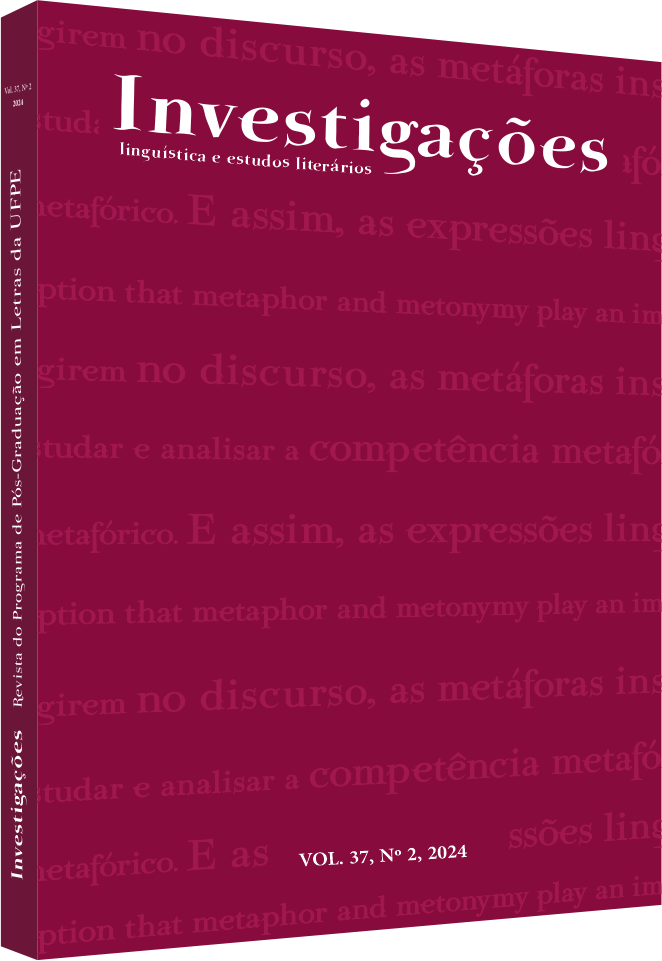Curricular knowledge on reading and linguistic production instruction
DOI:
https://doi.org/10.51359/2175-294x.2024.260571Keywords:
language courses, linguistic knowledge, teaching knowledgeAbstract
In this paper, we aim to (1) Identify the presence and functional nature of linguistic knowledge related to reading and linguistic production pointed out by teachers in training and (2) Relate the knowledge highlighted by teachers in training with the curricular knowledge included in the reading and production syllabi cited as a space for presenting linguistic knowledge necessary for teaching the Portuguese language in school education. To this end, we observed, through indisciplinary applied linguistics, syllabuses of theoretical reading and linguistic production subjects from language arts courses in Paraíba and responses from teachers in training to a Google form.
References
BEZERRA, M. Auxiliadora. Ensino de língua portuguesa e contextos teórico-metodológicos, p. 37-46. In: DIONÍSIO, A. Paiva; MACHADO; A. Rachel; BEZERRA, M. Auxiliadora (Org). Gêneros textuais & ensino. Rio de Janeiro: Lucerna, 2003.
BRAIT, B. CAMPOS, M. I. B. Da Rússia czarista à web. In: BRAIT, B. (Org.). Bakhtin e o Círculo. São Paulo: Contexto, 2009. p. 15-30.
CAVALCANTE, Mônica Magalhães et al. O texto e suas propriedades: definindo perspectivas para análise. (Con)Textos Linguísticos - Linguística Textual e Análise da Conversação: conceitos e critérios de análise, Espírito Santo, v. 13, n. 25, p. 25-39, set. 2019.
CAVALCANTE, Mônica Magalhães; MUNIZ-LIMA, Isabel. Texto e interação em ambiente digital. Entrepalavras, Fortaleza, v. 12, n. esp., e2419, p. 1-17, outubro/2022. DOI: 10.22168/2237- 6321-2419
CELANI, M. A. A. Transdisciplinaridade na linguística aplicada no Brasil. In: SIGNORINI, I.; CAVALCANTI, M. C. (org). Linguística aplicada e transdisciplinaridade: questões e perspectivas. Campinas: Mercado de Letras, 1998.
GERALDI, J. Wanderley. Portos de passagem. 2. ed. São Paulo: Martins Fontes, 1993.
GOMES-SANTOS, S. N.; SANTOS, Leonor, W. dos; SANTOS, M. F. Oliveira; TAFFARELLA; M. Cristina de M.; TRAVAGLIA, L. Carlos. A contribuição das(s) teorias do texto para o ensino. In: BENTES, A. Christina; LEITE, M. Quadros. Linguística de texto e análise da conversação: panorama das pesquisas no Brasil. São Paulo: Cortez, 2010.
KLEIMAN, A. B. (Org.). A formação do professor: perspectivas em linguística aplicada. Campinas: Mercado de Letras, 2001.
KOCH, Ingedore V; ELIAS, Vanda M. Ler e escrever: estratégias de produção textual. 2, ed. São Paulo: Contexto, 2011.
MARCUSCHI, L. Antônio. Linguística de texto: o que é e como se faz? São Paulo: Parábola, 2012.
MARCUSCHI, L. Produção textual, análise de gêneros e compreensão. São Paulo: Parábola, 2008.
MARTINS, M. Helena. O que é leitura. 11. ed. São Paulo: Brasiliense, 1989.
MARTINS, Mayara A. A caracterização dos tipos de dêixis como processos referenciais. Dissertação (Mestrado) – Universidade Federal do Ceará, Centro de Humanidades, Programa de Pós-Graduação em Linguística, Fortaleza, 2019.
MOITA LOPES, L. P. Linguística aplicada e vida contemporânea: problematização dos construtos que tem orientado a pesquisa. In: MOITA LOPES, L. P. (org.) Por uma Linguística Aplicada Indisciplinar. São Paulo: Parábola, 2008.
MOITA LOPES, L. P. Da aplicação de linguística à linguística aplicada indisciplinar. In: PEREIRA, R. C. E ROCA, P. (org.). Linguística aplicada: um caminho com diferentes acessos. São Paulo: Contexto, 2009
MOITA LOPES, L. P. Linguística Aplicada como lugar de construir verdades contingentes: sexualidades, ética e política. Gragoatá, Niterói, v. 27, p. 33-55, 2010.
NASCIMENTO, Maria Fernanda do. Conhecimentos linguísticos na formação acadêmica do professor de Língua Portuguesa: percepção dos conhecimentos curriculares sobre ensino de língua de graduandos de Cursos de Letras do Estado da Paraíba. Monografia (Licenciatura em Letras – Língua Portuguesa) - Universidade Federal de Campina Grande, Centro de Humanidades, 2023.
NASCIMENTO, M. F; RAFAEL, E. L. Conhecimentos sobre análise linguística em Cursos de Letras: da proposta curricular à visão dos graduandos. (no prelo)
PENNYCOOK, A. Uma linguística aplicada transgressiva. In: Kle LOPES, L. P. (org.) Por uma linguística aplicada indisciplinar. São Paulo: Parábola, 2008.
RAJAGOPALAN, K. Por uma linguística crítica. São Paulo: Parábola, 2003.
RAJAGOPALAN, K. The philosophy of applied linguistics, In: DAVIES, Allan., EDER, C. (Orgs). The handbook of applied linguistics. Oxford, UK: Blackwell Publishing, 2004. p. 397-420.
ROLLSING, L. Z.; NASCIMENTO, M. F. do; PERNA, C. B. L. O papel da esfera discursiva no ensino de língua portuguesa a partir das habilidades das práticas de estudo e pesquisa. Muiraquitã: Revista de Letras e Humanidades, [S. l.], v. 11, n. 2, 2023. DOI: 10.29327/266889.11.2-4. Disponível em: https://periodicos.ufac.br/index.php/mui/article/view/6961. Acesso em: 2 jul. 2024.
VOLÓCHINOV, Valentin (Círculo de Bakhtin). Marxismo e filosofia da linguagem. Problemas fundamentais do método sociológico na ciência da linguagem. Tradução: Sheila Grillo e Ekaterina Vólkova Américo. São Paulo: Editora 34, 2017.
Downloads
Published
How to Cite
Issue
Section
License
Copyright (c) 2024 Maria Fernanda do Nascimento

This work is licensed under a Creative Commons Attribution 4.0 International License.
Authors who publish with Revista Investigações agree to the following terms:
Authors retain copyright and grant the journal right of first publication with the work simultaneously licensed under the Creative Commons Attribution 4.0 International (CC BY 4.0) license that allows others to share the work with an acknowledgement of the work's authorship and initial publication in this journal.
Authors are able to enter into separate, additional contractual arrangements for the non-exclusive distribution of the journal's published version of the work (e.g., post it to an institutional repository or publish it in a book), with an acknowledgement of its initial publication in this journal.
You are free to:
Share — copy and redistribute the material in any medium or format for any purpose, even commercially.
Adapt — remix, transform, and build upon the material for any purpose, even commercially.
The licensor cannot revoke these freedoms as long as you follow the license terms.
Under the following terms:
Attribution — You must give appropriate credit , provide a link to the license, and indicate if changes were made . You may do so in any reasonable manner, but not in any way that suggests the licensor endorses you or your use.
No additional restrictions — You may not apply legal terms or technological measures that legally restrict others from doing anything the license permits.

